RSV is a common and very contagious virus worldwide. Most children get it at least once by age two. Sometimes, it can lead to lung infections or other problems, especially in babies. It's important to watch the symptoms and go to the health centre if there are concerns for your child's health.
Symptoms of RSV
RSV usually has similar symptoms to a bad cold, including:
- Cough
- Stuffy or runny nose
- Mild sore throat
- Earache
- Fever
- Wheezing (Whistling sound when you breathe)
- Trouble breathing
Babies with RSV may also have no energy, be fussy, cry a lot, and be less hungry than usual. Some infants or toddlers may experience symptoms that are more severe, such as difficulty breathing, requiring greater medical intervention.
Watch your baby's symptoms closely. If symptoms get worse, contact your health care provider.
If a baby or child is wheezing or having trouble breathing, visit or call the health centre.
Reducing the risk of RSV
RSV is contagious, like a common cold. Some ways to reduce the risk are:
- Wash your hands often, especially in public places, where the chance of picking up RSV is high.
- Always wash your hands before touching or feeding a baby.
- Do not touch someone else's baby when you are sick.
- Cover your mouth and nose when you cough or sneeze.
- Cut back or stop smoking . Keep babies and young children away from second-hand smoke. Do not smoke with your child in the amauti.
- Make sure your child's vaccinations are up to date and complete.
- Breastfeeding helps babies fight off germs like RSV.
- For some high-risk babies, there is a monthly injection (shot) called Palivizumab (Synagis®) that may help protect them from getting RSV. For example, if a child was born early (premature), a health care provider may recommend Synagis®. Synagis® is an injection given every month during RSV season to high-risk babies. Ask your health care provider if you have questions about the Synagis® program.
Treating RSV
RSV often goes away by itself. If a child has RSV, you can:
- Prop up their head to make it easier for them to breathe and sleep.
- Encourage them to drink lots of fluids. Older children can drink water (hot or cold, tea, broth and soups. Babies should continue to have only breastmilk or infant formula.
- Increase the moisture in the air in your house. You can use a humidifier in the child's bedroom to help with breathing.
- If needed, give children’s over-the-counter medication (like Tylenol) to help with symptoms. Always follow the instructions. Pills can have side effects, especially when too much is used.
- Do not give aspirin to anyone under 20 years old. It is linked to Reye syndrome, a serious illness that affects the liver and brain.
- If your baby is under 6 months, watch their symptoms closely. If symptoms get worse, contact your health care provider.
- If a baby or child is wheezing or having trouble breathing, visit or call the health centre.
Recent news on RSV
- The Department of Health is committed to the health and well-being of children in territory.
- Synagis® is not like typical childhood vaccines. It is a monthly injection and it is not clear how well it works.
- We are concerned that incomplete and misleading information on this topic may be being circulated at the moment
- Nunavut’s Synagis® program has existed for many years and is consistent with the best available evidence and guidelines on this topic. It is reviewed every year to ensure it continues to be in line with best practice.
The best approach to these programs is still being studied and the team is following those research efforts closely.



